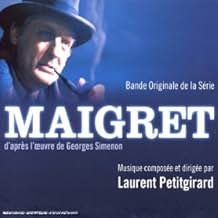VALUTAZIONE IMDb
7,9/10
913
LA TUA VALUTAZIONE
Il pragmatico, riservato e raffinato Maigret indaga sugli omicidi con la sua singolare disinvoltura e scopre inevitabilmente la verità.Il pragmatico, riservato e raffinato Maigret indaga sugli omicidi con la sua singolare disinvoltura e scopre inevitabilmente la verità.Il pragmatico, riservato e raffinato Maigret indaga sugli omicidi con la sua singolare disinvoltura e scopre inevitabilmente la verità.
- Premi
- 1 vittoria in totale
Sfoglia gli episodi
Recensioni in evidenza
There are two great Maigret adaptations available online or in DVDs from the 1990s, the British version done by Granada for two seasons in 1992, starring Michael Gambon, and the Dune French version that lasted from 1991 until 2005 with Bruno Cremer. Both have strong qualities, although in many ways they are completely opposite. Gambon's Maigret is affable, poetic, emotional, sympathetic, and works in close concert with his men; his Paris (Budapest) is sunny and bright. Cremer's Maigret is taciturn and intense, preferring to wait silently while people reveal themselves, riding his men hard at times, especially the often incompetent officers he encounters outside of Paris; and his Paris (Prague) is always gray or pitch black, dark wet streets, his pipe glowing. In many ways the visual look of the shows are opposite, with the British series relying more on the romance and nostalgia of Paris, while the French series is a showcase for the dark psychological mysteries of Simenon. The French series hews more closely to the original stories, and also has the advantage of the episodes being 30 minutes longer; it is also a more complete canon, with nearly 5 times as many stories. In the Gambon series, Gambon is more pleasant, his men work with him as a clever team, and we see much more of Mme. Maigret, who appears in nearly every episode, but the humor and the characterizations are typically British, which can be somewhat disconcerting. The Cremer Maigret varies in quality with the directors, but he is almost always brilliant, playing his hunches and guiding his investigations with a deep psychology that truly honors the original Simenon novels. And it goes almost without saying, the French version pulls no punches and has a much darker way of exploring aspects of the French character that the heart of Simenon; Cremer spends a lot of time listening to people and asks questions which seem strange but reveal hidden truths. Gambon's Maigret does more of the talking and seems to succeed more through luck and teamwork, which may be failings of the shorter format and the transition from French to English storytelling. I'm fond of them both, but the Cremer Maigret is one of my favorite television programs, with plenty to love, at over 75 hours. It is also possible to watch the Cremer Maigret's over and over, picking out new clues and details, but there is no such depth to Gambon's Maigret.
The Bruno Cremer "Maigret" series is exceptional and reminds me of those great British books-to-television mystery series from the 80s/90s such as Jeremy Brett's Sherlock Holmes, David Suchet's Hercule Poirot, and (my favorite) John Thaw's Inspector Morse. What I enjoy most about the Cremer series is how well it captures the atmosphere-bars, bistros, apartments, mansions, the wet pavement of the streets, peripheral noises, the varied dialogue, and the quiet moments--that the author George Simenon brings to his books (both his "Maigret" titles and his other novels--I've read all the Maigret stories and several of his other titles). One doesn't read Simenon's Maigret mysteries simply for setup, epiphanous moment, and denouement. I would say the same is true of watching this series. Getting to and finding out "Who did it?" matters, yes, but only a bit. The best parts are the lingering moments in between.
One wise decision made in developing this Maigret series is that all episodes are set in the late 40s through the 50s. Simenon's Maigret novels span across several decades (30s - early 70s) and the change in ages, fashions, cars, and architecture would have been a challenge. And of course, there would have been the war years and the German occupation of Paris. While not actually shot in Paris, who cares? This is the Paris of the late 40s and early 50s, maybe not in reality but the Paris of our-at least, my-imagination, the Paris that Simenon paints in his stories. Capturing that look and feel is crucial if one is to film Simenon. I applaud the filmmakers.
Generally, these episodes adhere to their corresponding novel. Not always and seldom perfectly. I don't mind an addition or embellishment here or there. It's the nature of book-to-film, but if one does it then one better do it well. In this series, it's usually, but not always, done quite well. Bruno Cremer embodies Maigret and delivers, for me, the character I imagined when reading the novels. I'm grateful for the 54 episodes in this series. I wish there were more. (There are over 100 Maigret stories counting both novels and short stories.)
BY THE WAY, In Simenon's Maigret stories, Maigret's assistants change with some being given more prominence than others in different books. Those assistants include Lucas, LaPointe, Torrence, Dufour, and Janvier, among others. The filmmakers sometimes condense these characters into maybe one or two where in the book there are two or three or more. It seldom, if ever, affects the story or plot. While true that Lucas appears more in the novels than in this series he is NOT in every novel as Maigret's right hand man (as one reviewer persists in claiming).
My review here and of individual episodes are based on the DVD set.
One wise decision made in developing this Maigret series is that all episodes are set in the late 40s through the 50s. Simenon's Maigret novels span across several decades (30s - early 70s) and the change in ages, fashions, cars, and architecture would have been a challenge. And of course, there would have been the war years and the German occupation of Paris. While not actually shot in Paris, who cares? This is the Paris of the late 40s and early 50s, maybe not in reality but the Paris of our-at least, my-imagination, the Paris that Simenon paints in his stories. Capturing that look and feel is crucial if one is to film Simenon. I applaud the filmmakers.
Generally, these episodes adhere to their corresponding novel. Not always and seldom perfectly. I don't mind an addition or embellishment here or there. It's the nature of book-to-film, but if one does it then one better do it well. In this series, it's usually, but not always, done quite well. Bruno Cremer embodies Maigret and delivers, for me, the character I imagined when reading the novels. I'm grateful for the 54 episodes in this series. I wish there were more. (There are over 100 Maigret stories counting both novels and short stories.)
BY THE WAY, In Simenon's Maigret stories, Maigret's assistants change with some being given more prominence than others in different books. Those assistants include Lucas, LaPointe, Torrence, Dufour, and Janvier, among others. The filmmakers sometimes condense these characters into maybe one or two where in the book there are two or three or more. It seldom, if ever, affects the story or plot. While true that Lucas appears more in the novels than in this series he is NOT in every novel as Maigret's right hand man (as one reviewer persists in claiming).
My review here and of individual episodes are based on the DVD set.
An excellent detective series for any nation, and yet I've seen a lot of them, ancient or modern.
Quickly, what differentiates this Maigret 1991 from other detective series is the atmosphere, the weightlessness and above all the reality that sticks to the skin of this universe.
Maigret is a gruff bear, certainly, but he has the gift of empathy: he loves people (even delinquents) and that can be seen on the screen.
Everyone has a chance with him: he takes his time to live with them, to live in the dirt, to live in the filth of this world in which he appears like a breath of air.
I like Bruno Cremer in this series because he is both human and the God of this world.
I'm more than tired of the series that we see too often in videos on demand, in which the houses don't have an ounce of dust, in which everything is smooth, all the actors are beautiful and all the investigations are solved with DNA.
No, that's not the truth.
The truth, the reality, is rather in the darkness and filth depicted by this series.
For me, it is masterful.
Quickly, what differentiates this Maigret 1991 from other detective series is the atmosphere, the weightlessness and above all the reality that sticks to the skin of this universe.
Maigret is a gruff bear, certainly, but he has the gift of empathy: he loves people (even delinquents) and that can be seen on the screen.
Everyone has a chance with him: he takes his time to live with them, to live in the dirt, to live in the filth of this world in which he appears like a breath of air.
I like Bruno Cremer in this series because he is both human and the God of this world.
I'm more than tired of the series that we see too often in videos on demand, in which the houses don't have an ounce of dust, in which everything is smooth, all the actors are beautiful and all the investigations are solved with DNA.
No, that's not the truth.
The truth, the reality, is rather in the darkness and filth depicted by this series.
For me, it is masterful.
I know that I may be opening myself up to some fierce criticism but I absolutely am mezmerized by Bruno Cremer's portrayal of French detective, Maigret.
His subtlety makes me wonder what he is up to and then Bam!!! He'll open up into a fit of rage at a fellow detective or criminal. I love watching him smile and wish that he would give a more emotional reaction when he is pleased.
I missed the interaction with his wife about half way through the series. They were very 'human' snipets' of a very well protected set of emotions. Anyhow, as a couple they were cute!
I am on my third run through the series, consecutively. No gaps, just straight from the last episode to episode one!
I saw sad to find out that he had passed in 2010. For me a great actor portraying one of the greats in mystery/suspense.
His subtlety makes me wonder what he is up to and then Bam!!! He'll open up into a fit of rage at a fellow detective or criminal. I love watching him smile and wish that he would give a more emotional reaction when he is pleased.
I missed the interaction with his wife about half way through the series. They were very 'human' snipets' of a very well protected set of emotions. Anyhow, as a couple they were cute!
I am on my third run through the series, consecutively. No gaps, just straight from the last episode to episode one!
I saw sad to find out that he had passed in 2010. For me a great actor portraying one of the greats in mystery/suspense.
There have been some outstanding portrayals of Maigret, the most recent Rowan Atkinson versions being quite good, but Bruno Cremer best invokes the spirit of books. Maigret is NOT a procedural, although they are certainly mysteries. They are about people and the human condition, best demonstrated by Maigret's compassion. Sometimes for victims, and yes, sometimes even for the criminals. If there is any failing at all in this fine series, it is the relative absence of his wife, who features more strongly in the books and some other versions. One of the most re-watchable series, I had depended on MHZ to view it and finally obtained a DVD set of the entire series. If you love mysteries, you simply can NOT skip over Maigret.
I più visti
Accedi per valutare e creare un elenco di titoli salvati per ottenere consigli personalizzati
- How many seasons does Maigret have?Powered by Alexa
Dettagli
Contribuisci a questa pagina
Suggerisci una modifica o aggiungi i contenuti mancanti

Divario superiore
By what name was Il commissario Maigret (1991) officially released in India in English?
Rispondi
















